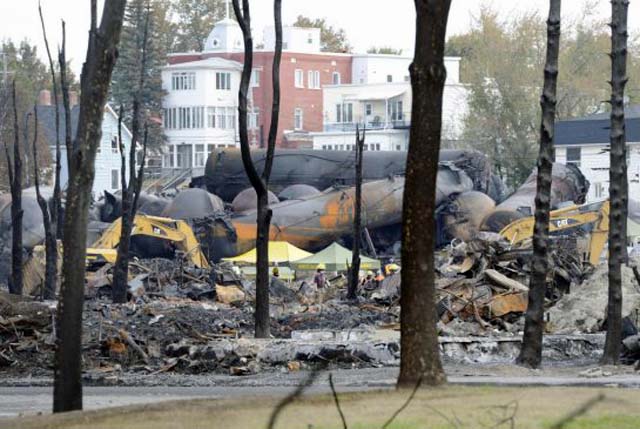

Some time after the fires were put out - Date unknown Ryan Remiorz.
16 August 2013 MMA Railway Gets Permission to
Operate Until 1 Oct 2013 Ottawa Ontario - The railway company implicated in last month's deadly Lake Megantic train explosion can continue operations through to this fall, the Canadian Transportation Agency says.
The federal regulator had ordered Montreal Maine & Atlantic Railway (MMA) to shut down its Canadian operations by next Tuesday after a month-long review determined it no longer had sufficient insurance coverage to deal with the claims from the 6 Jul 2013 derailment and explosion, as well as up to two additional accidents.
The Maine-based rail carrier was turned down again on Thursday after it asked the federal agency to reconsider its decision, but was successful in a second request on Friday.
"The agency has considered your submission and finds that you have demonstrated that there are new facts and circumstances warranting a review of the order," reads a letter released to the Star Friday evening. "Your submission provides evidence that MMA has insurance coverage."
No further information was provided, but it appears that the cash-strapped company will use some or all of its $18 million in Canadian assets as a security to cover the costs of its mandatory self-insurance policy.
"The agency is satisfied that this provides adequate insurance coverage for operation over a short period from 20 Aug 2013 to 1 Oct 2013," the transportation regulator said in the letter.
The permission to continue operations is conditional on MMA providing proof by next Friday, 23 Aug 2013, that it has secured enough funds to pay for the self-insurance portion of its coverage.
The company has seen a growing line up of creditors banging on its door and filing applications in court that would force it to cover the costs of the crash, including damaged rail cars, a cleanup bill likely to exceed $200 million, and compensation to the families of the estimated 47 people killed in the derailment and crash.
Earlier in the day, the overseer appointed by a Quebec court to handle the rail company's bankruptcy filing said they were ready to ask a judge to overturn the federal order to cease operations, in order to stave off a panicked state of affairs that has the rail carrier looking for firms to lease the use of its track or buy the ailing business outright.
"Everything is on the table" as the company tries to keep its head above water while the financial claims against it continue to mount.
"If the company was to find an operator until a purchaser is found then the company would entertain that possibility," said Gilles Robillard, who was named last week by a Quebec judge to handle the firm's bankruptcy proceedings.
Talks toward an eventual sale of the shortline railway that operates in the northeastern United States and in Quebec are also proceeding, but nothing will be finalized in the coming days, he said.
In the meantime, the company's plan to pay its bills and potential future legal claims is dependent on it continuing operations and maintain the value of its business at least until it can be sold off. MMA has pledged not to haul any dangerous materials, such as the light crude oil that spilled, burned, and destroyed a wide swath of the tourist town of 6,000 people near the Quebec-Maine border.
If the plan that was approved by a Quebec judge in MMA's bankruptcy filing can't be carried out, there could be grave implications for many, said Robillard.
That includes the many businesses that rely on rail service to receive raw materials and ship products to market as well as those like the town of Lake Megantic and the Quebec government that have had to pay the company's bills for the clean-up of soil and water.
The Quebec government this week ordered Canadian Pacific Rail, who signed a contract with MMA to transport the petroleum, to help pick up the cleanup tab, which it is so far refusing to do.
Putting the rail company out of business could make it more difficult for families of the dead and those who have lost homes and businesses to obtain financial compensation through a class-action lawsuit, said Robillard.
"It depends on the ability of the company to be in operations," he said. "From the assets of Montreal Maine & Atlantic they won't be satisfied because between the insurance and everything, the numbers that have been put forward with respect to the contamination costs, we're talking big money."
Allan Woods.



Vancouver Island
British Columbia
Canada
| 
